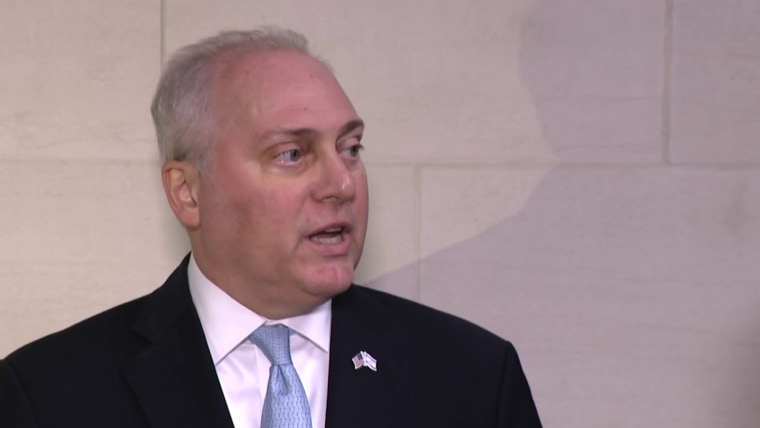After Rep. Kevin McCarthy’s ignominious removal from the House speakership last week, Rep. Steve Scalise has been pushed forward as the House GOP’s nominee for speaker — and the smiling face of Republican denialism. If there’s an obvious truth that can’t be reconciled with a Republican talking point or goal, then there may be no better person to smile and pretend the truth isn’t the truth than the Louisiana Republican.
If there’s an obvious truth that can’t be reconciled with a Republican talking point, then there may be no better person to pretend the truth isn’t the truth than the Louisiana Republican.
Consider the June 9, 2022, news conference where Scalise, then the House minority whip, said his colleague Rep. Jim Banks, R-Ind., was right to ask whether then-Speaker Nancy Pelosi was “involved in the decision to delay National Guard assistance on Jan. 6.” Four months after that news conference came the release of video of that day that captured Scalise standing within an arm’s length of Pelosi (and apparently paying attention) as she, with her phone on speaker mode, demanded a military response.
There’s the Republican narrative about who Republicans are, who the Democrats are and what Pelosi represents, and then there’s the reality of Pelosi taking charge and acting in the best interest of her country as an angrily pouting Republican president does nothing. These two things — the narrative and the reality — conflict. So Scalise, who had observed Pelosi’s vocal advocacy, suggested that the attack on the U.S. Capitol was somehow her fault and not Donald Trump’s.
And when confronted with video evidence that he was standing near Pelosi on Jan. 6, what did Scalise say? His spokesperson Lauren Fine told The Washington Post that he was asking “why wasn’t the National Guard called prior to the day of?” What a dishonest response.
But it wasn’t surprising. The year before, in an October 2021 interview with Chris Wallace on Fox News, Scalise refused to answer Wallace’s simple question: “Do you think the 2020 election was stolen from Donald Trump?”
Scalise still appears to be unwilling to answer that question. CNN’s Manu Raju posted to the platform X on Wednesday that Rep. Ken Buck, R-Colo., said he wouldn’t vote for Scalise or Rep. Jim Jordan, R-Ohio, “since neither man would answer his question yesterday about whether the 2020 election was stolen.”

Take it from someone who was Scalise’s constituent for many years and who interviewed him many times as a member of The Times-Picayune editorial board: I’ve never seen his characteristic affability serve as anything but a cover for harmful policies or as a deflection for a political scandal. And though he’s had Democrats come forward to vouch for him and declare their friendship, I’ve never seen those friendships translate into policies that help those Democrats’ voters.
The same politician who shrugs at the erosion of democracy similarly shrugs as Louisiana’s coast, which is home (or close to home) to all his constituents, dissolves into the Gulf of Mexico. Scalise knows as well as anybody that the oil and gas industry is largely responsible both for destroying Louisiana’s wetlands and for an ever-warming climate.
Though he’s had Democrats come forward and declare their friendship, I’ve never seen those friendships translate into policies that help those Democrats’ voters.
But as Congressional Quarterly noted in October 2018, a CQ analysis “shows that a majority of the 20 congressional districts facing the highest risk from rising sea levels, more frequent and severe storms and other climate effects by the end of the century are represented by lawmakers — mostly Republicans — who tend to vote against measures to slow global warming, such as efforts to reduce carbon emissions.” That piece called out Scalise in particular. In the summer of 2018, Scalise was among the Republicans who authored a Republican resolution opposed to taxes on carbon as “detrimental” to the U.S. economy.
Such a resolution isn’t in the interest of the people he represents in Washington. As one of his Democratic opponents asked before the 2018 midterm elections, Scalise “has been in a position of power for a long time, and what has it gotten Louisiana?” That opponent was right when she said, “He’s put party over people and power over people and special interests over people.”
There’s no way that an elected official who spoke at an event for a white-power group organized by a David Duke lieutenant should ever be two heartbeats away from the presidency of the United States. In a sensible country, the revelation that Scalise had addressed the European-American Unity and Rights Organization in 2002 when he was a state representative should have ended his career. But he survived, thanks in part to then-Rep. Cedric Richmond, a Black Democrat who’d also served with him in Baton Rouge, who said Scalise didn’t have a “racist bone in his body.”
Scalise said, “It was a mistake I regret, and I emphatically oppose the divisive racial and religious views groups like these hold.” For good measure, he said about his 2002 speech to EURO, “I was without the advantages of a tool like Google. It’s nice to have those. Those tools weren’t available back then.”
I’ve been trying to reconcile Scalise’s claim that Google didn‘t exist in 2002 with the facts that he majored in computer science and worked as a computer programmer.
I’ve been trying since December 2014 to reconcile Scalise’s claim that Google didn't exist in 2002 with the facts that he majored in computer science and worked as a computer programmer. But to no avail. Then again, who needs Google, or even a computer, to discern what a group calling itself the “European-American Unity and Rights Organization” might be about?
Scalise was one of two Republicans under consideration for speaker Wednesday. The other, Jordan, whose Trump sycophancy is legendary, is gruffer, more combative and far less likely to be seen wearing a jacket.
But on the issues that matter, Scalise is no different from Jordan. Even if he gives the appearance that he is.

